Link in Bio!

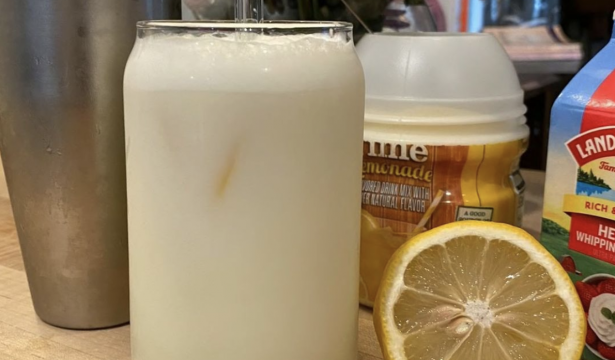


There has been much talk around the possibility that Americans are feeling less enamored with the benefits of living in a large city and now may be longing for the open spaces that suburban and rural areas provide.
In a recent Realtor Magazine article, they discussed the issue and addressed comments made by Lawrence Yun, Chief Economist for the National Association of Realtors (NAR):
“While migration trends were toward urban centers before the pandemic, real estate thought leaders have predicted a suburban resurgence as home buyers seek more space for social distancing. Now the data is supporting that theory. Coronavirus and work-from-home flexibility is sparking the trend reversal, Yun said. More first-time home buyers and minorities have also been looking to the suburbs for affordability, he added.”
NAR surveyed agents across the country asking them to best describe the locations where their clients are looking for homes (they could check multiple answers). Here are the results of the survey:
According to real estate agents, there’s a strong preference for less populated locations such as suburban and rural areas.
Zelman & Associates surveys brokers and owners of real estate firms for their monthly Real Estate Brokers Report. The last report revealed that 68% see either a ‘moderate’ or ‘significant’ shift to more suburban locations. Here are the results of the survey: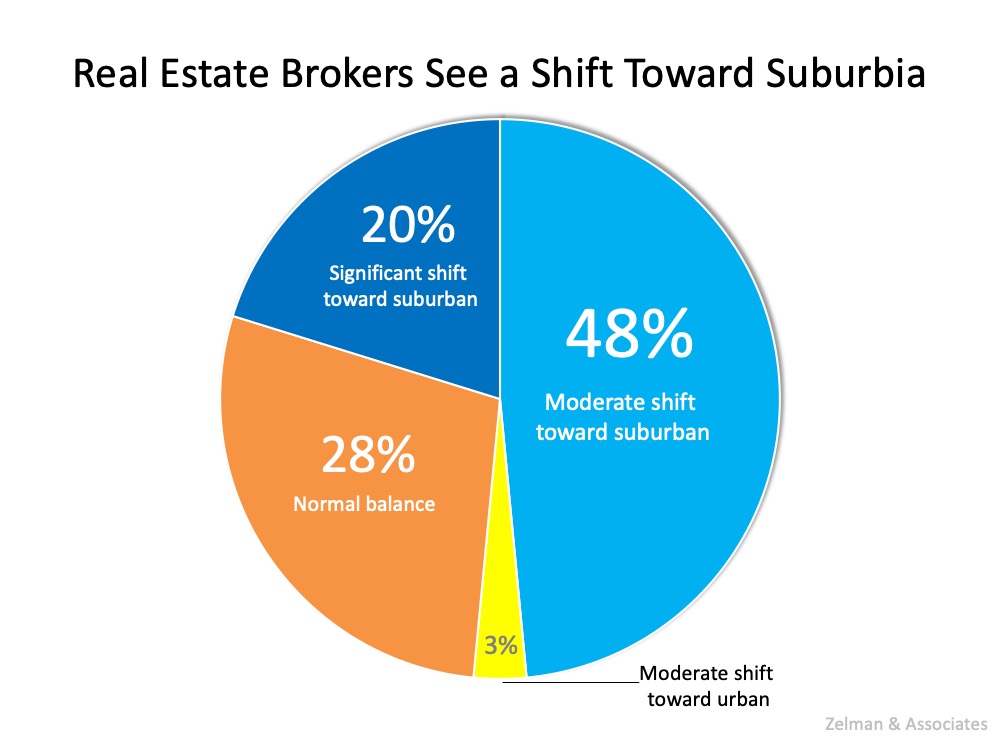
No one knows if this will be a short-term trend or an industry game-changer. For now, there appears to be a migration to more open environments.
Photo by Nick Sarvari on Unsplash

While many people across the U.S. have traditionally enjoyed the perks of an urban lifestyle, some who live in more populated city limits today are beginning to rethink their current neighborhoods. Being in close proximity to everything from the grocery store to local entertainment is definitely a perk, especially if you can also walk to some of these hot spots and have a short commute to work. The trade-off, however, is that highly populated cities can lack access to open space, a yard, and other desirable features. These are the kinds of things you may miss when spending a lot of time at home. When it comes to social distancing, as we’ve experienced recently, the newest trend seems to be around re-evaluating a once-desired city lifestyle and trading it for suburban or rural living. George Ratiu, Senior Economist at realtor.com notes:
“With the re-opening of the economy scheduled to be cautious, the impact on consumer preferences will likely shift buying behavior…consumers are already looking for larger homes, bigger yards, access to the outdoors and more separation from neighbors. As we move into the recovery stage, these preferences will play an important role in the type of homes consumers will want to buy. They will also play a role in the coming discussions on zoning and urban planning. While higher density has been a hallmark of urban development over the past decade, the pandemic may lead to a re-thinking of space allocation.”
The Harris Poll recently surveyed 2,000 Americans, and 39% of the respondents who live in urban areas indicated the COVID-19 crisis has caused them to consider moving to a less populated area.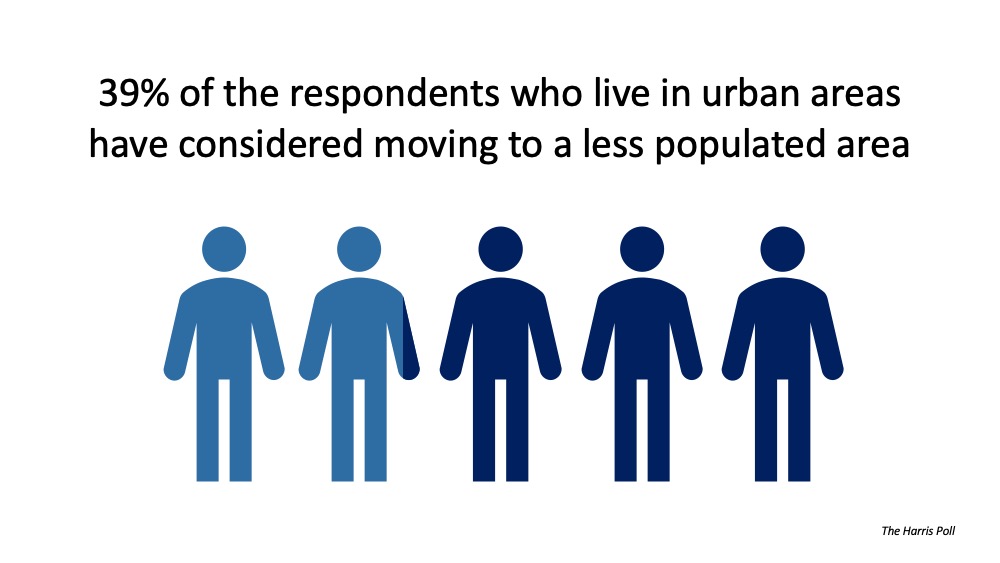 Today, moving outside the city limits is also more feasible than ever, especially as Americans have quickly become more accustomed to – and more accepting of – remote work. According to the Pew Research Center, access to the Internet has increased significantly in rural and suburban areas, making working from home more accessible. The number of people working from home has also spiked considerably, even before the pandemic came into play this year.
Today, moving outside the city limits is also more feasible than ever, especially as Americans have quickly become more accustomed to – and more accepting of – remote work. According to the Pew Research Center, access to the Internet has increased significantly in rural and suburban areas, making working from home more accessible. The number of people working from home has also spiked considerably, even before the pandemic came into play this year.
If you have a home in the suburbs or a rural area, you may see an increasing number of buyers looking for a property like yours. If you’re thinking of buying and don’t mind a commute to work for the well-being of your family, you may want to consider looking at homes for sale outside the city. Let’s connect today to discuss the options available in our area.

Homes cost a lot of money to maintain. But are you spending extra money unnecessarily on upkeep? Here are seven of the most expensive mistakes you could be making in your home:
1. Using Traditional Light Bulbs. If you still have incandescent light bulbs in your home, you could be throwing a lot of money away every month on inflated electric bills. Over its life span, an incandescent bulb can use almost $200 worth of electricity. A CFL will only use about $40 worth of electricity over the same time period. Even better is the LED bulb, which only uses around $30 per bulb. Think what replacing every light bulb in your home could do to your home’s bottom line!
2. Letting Faucets Leak. A leaky faucet that drips one drop per second can waste more than 3,000 gallons per year, which is enough water to take more than 180 showers. Some people live in areas where water is plentiful, but for others in areas plagued with drought, this could be costing a fortune. Fix or replace your leaky faucet, and save a ton on your water bill.
3. Using the Wrong Air Filter Size. We all sometimes forget to change out the air filters for our HVAC systems or accidentally buy the wrong size. But using the wrong filter or a dirty one can increase your power bill and cause expensive problems for your furnace down the road. Use the correct filters for your system, and set a reminder to change them after the recommended amount of time. You won’t regret it.
4. Not Customizing the Temperature. Invest in a customizable thermostat. If you’re away at the office all day, you can program your heater to shift down a few degrees while you’re gone and then shift back up shortly before you return home. Heating or cooling an empty home wastes a lot of money in energy costs.
5. Not Adjusting Air Vents Properly. Is one room in your home hot, while the others are cold? Oftentimes homeowners will crank up the air conditioning in the whole house to combat hot temperatures in one area. Instead, adjust air vents to direct the flow of air more evenly throughout your entire home. Professionals will come regulate this to ensure your entire home is receiving the same amount of air conditioning or heating.
6. Overwatering the Lawn. Many homeowners have their sprinkler systems programmed to come on in the early morning hours for optimum lawn health. This can become a problem, however, if you’re never around to see what you’re actually watering. A broken sprinkler head could be causing a fountain, or the trajectory of your sprinkler may be directed at a fence instead of your lawn. Periodically run your sprinklers during the day so you can see how they’re performing when you’re not around.
7. Ignoring Leaky Windows and Doors. Leaky windows and doors are great places for cold winds or hot air to enter your home. Many homeowners simply ignore them and crank up their heaters or AC. Caulk leaky windows and put rubber seal around doors to maintain your indoor climate.
Use these tips to cut maintenance costs on your home today.
Photo by Moja Msanii on Unsplash

Through all the volatility in the economy right now, some have put their search for a home on hold, yet others have not. According to ShowingTime, the real estate industry’s leading showing management technology provider, buyers have started to reappear over the last several weeks. In the latest report, they revealed:
“The March ShowingTime Showing Index® recorded the first nationwide drop in showing traffic in eight months as communities responded to COVID-19. Early April data show signs of an upswing, however.”
Why would people be setting appointments to look at prospective homes when the process of purchasing a home has become more difficult with shelter-in-place orders throughout the country?
Here are three reasons for this uptick in activity:
1. Some people need to move. Whether because of a death in the family, a new birth, divorce, financial hardship, or a job transfer, some families need to make a move as quickly as possible.
2. Real estate agents across the country have become very innovative, utilizing technology that allows purchasers to virtually:
All of this can happen within the required safety protocols, so real estate professionals are continuing to help families make important moves.
3. Buyers understand that mortgage rates are a key component when determining their monthly mortgage payments. Mortgage interest rates are very close to all-time lows and afford today’s purchaser the opportunity to save tens of thousands of dollars over the lifetime of the loan.
Looking closely at the third reason, we can see that there’s a big difference between purchasing a house last December and purchasing one now (see chart below):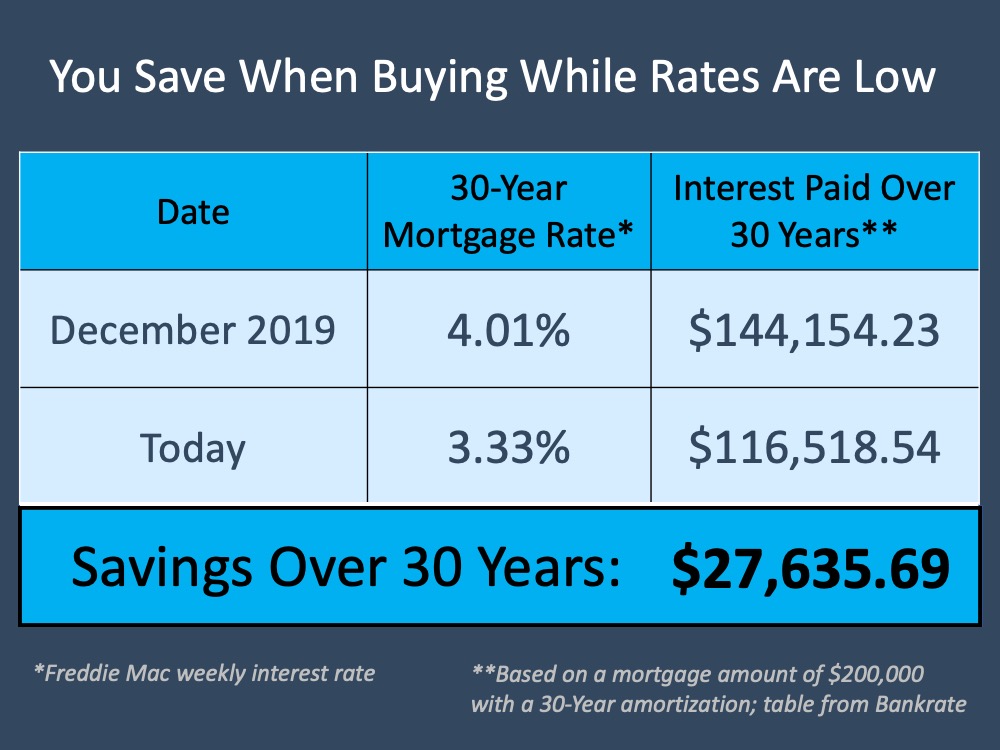
Many families have decided not to postpone their plans to purchase a home, even in these difficult times. If you need to make a move, let’s connect today so you have a trusted advisor to safely and professionally guide you through the process.
Photo by Wynand van Poortvliet on Unsplash

Hi there! Thank you so much for giving me the opportunity to consult with you about your move. I hope you are as excited as I am to get started on this journey selling your current digs.
As we move forward, there are a few items I would like to refer you to. It’s totally possible I have already handed a physical packet to you. On the other hand, if our meeting is going to be virtual, or somewhere down the road, this might serve as the best place to “give” you these items.
If you click on the photo on the right, you will find my seller trifold. This has some information about me and about selling in general. I give it to everyone who has a consultation with me, whether I’ve known them for 10 years or 10 minutes. Take a minute to check it out.

Next is the Seller Infographic.
This is exactly what it looks like in the picture. It’s a roadmap that will outline the steps from here (our consult) to closing. When you click on it, take note that there are two pages. The second page gives you a brief description of each step.
It would be a great idea to familiarize yourself with each step a little and write down any questions you might have. Most will probably be answered as we go along, but I’m happy to go over anything in advance.

I may have already said this when we spoke, but in case I didn’t, the Seller Consult is something I do with all clients. I’ll speak to this more when we sit down but this is an integral part of the process and the process is what drives every transaction from start to finish.
Bonus: So what’s the image on the right? Another thing we do at Metropolist is produce a bi-annual print magazine. In our most recent version you will find statistical information about the current market, broken down by neighborhood as well as an overall look at the King County Metro area. You will also get feature articles about our brokers, and fun anecdotes about life as a real estate agent.
I look forward to sitting with you (virtually or in person), and I’m excited to see how I can help you sell your home. In the meantime, write down any questions you have about the process and we will go over them soon!
Best,
Domenica
In these truly unprecedented times, it is easy to lose focus with your business. One of the best ways to combat this is by learning new skills and expanding the products you currently offer your clients.
Whether it be virtual home tours or learning how to utilize your Instagram account more effectively, there are numerous ways you can be a resource for your clients while stuck at home. Here are some useful tips:
Expand Your Digital Offerings
Perhaps nothing is more important right now than expanding what you currently offer your clients online. One of the most popular avenues real estate professionals are going down is providing virtual home tours. However, targeted Facebooks ads and virtual staging are others that are worth looking into or expanding upon if you already offer them. These are important products to be comfortable with as they’re becoming more and more popular.
Beef Up Your Social Media Presence
It is crucial that you’re at your clients’ disposal for most of the day. Being more diligent about answering texts, phone calls and emails is very important, but perhaps just as important is keeping up with engagement on your social media accounts. During this pandemic, your current and prospective clients will have a lot of questions. Many people may message you via Instagram or comment on your Facebook posts with inquiries. Get in the habit now of responding to these folks daily, as this is a skill that will be valuable to your business even after this moment is well past us.
Look to the Future
Take some time this weekend to really reflect on how you and your business reacted to the coronavirus outbreak. Very few people were ready for what happened (and what continues to impact our businesses), but that doesn’t mean you can’t be ready should this ever occur again. Additionally, take advantage of some of the numerous free webinars that are currently being offered online which speak to this topic. The goal is to come out of this period with more skills that’ll leave you better prepared for the future.
Agents, in what other ways are you learning and developing new skills during this pandemic?
Jameson Doris is RISMedia’s social media/blog editor. Email him your real estate news ideas at [email protected].
Photo by Jonatan Pie on Unsplash
My business partner and Designated Broker at Metropolist, Chad Zinda, takes a deeper look positivity in these trying times:
When the quarantine first started, I was determined to be available to the whole Metropolist team; from 7 a.m. to 7 p.m., I was making sure everyone else was okay and had what they needed to succeed. But then the stay-at-home order was issued, stretching us into unknown territory, and my routine was no longer sustainable. Flight attendants tell us the same thing before every flight. Put on your own oxygen mask first. I was struggling to find a new routine because I was too busy making sure everyone else could breathe.
You know those rumble strips on the road for truckers that wake them up if they begin to drift off? I was hitting those every day, earlier and earlier. Something had to change.
I turned to the most valuable activity, my trusted companion, exercise–of the body and of the mind–and I turned off the news. In the beginning, I was watching the news constantly. My screen time notification told me I was looking at my phone 30% more. And that time was spent consuming all bad news. I needed to reset if I was going to achieve a positive mindset.
In her podcast, Brené Brown says that when we are in crisis mode we either over- or under-function. I over-function. The key is self-care; to start with yourself. This pandemic is scary, and sad. We are experiencing a loss. We are all grieving “the way it was” and we are all dealing with it differently. It is okay to mourn. But I also have to remind myself that we won’t always be isolated and we won’t always feel this level of disconnection.
If you need a reminder of your purpose and new connections to motivate you, you are welcome to join us for our weekly production meeting every Wednesday at 10 am. We have tools and support to offer you to help you survive and thrive during COVID19 and beyond. Email me at [email protected] and I will send you an invitation so we can get back to business together.
By Chad Zinda
Photo by http://www.diwasphotography.com/
With over 90% of Americans now under a shelter-in-place order, many experts are warning that the American economy is heading toward a recession, if it’s not in one already. What does that mean to the residential real estate market?
According to the National Bureau of Economic Research:
“A recession is a significant decline in economic activity spread across the economy, lasting more than a few months, normally visible in real GDP, real income, employment, industrial production, and wholesale-retail sales.”
COVID-19 hit the pause button on the American economy in the middle of March. Goldman Sachs, JP Morgan, and Morgan Stanley are all calling for a deep dive in the economy in the second quarter of this year. Though we may not yet be in a recession by the technical definition of the word today, most believe history will show we were in one from April to June.
Many fear a recession will mean a repeat of the housing crash that occurred during the Great Recession of 2006-2008. The past, however, shows us that most recessions do not adversely impact home values. Doug Brien, CEO of Mynd Property Management, explains:
“With the exception of two recessions, the Great Recession from 2007-2009, & the Gulf War recession from 1990-1991, no other recessions have impacted the U.S. housing market, according to Freddie Mac Home Price Index data collected from 1975 to 2018.”
CoreLogic, in a second study of the last five recessions, found the same. Here’s a graph of their findings: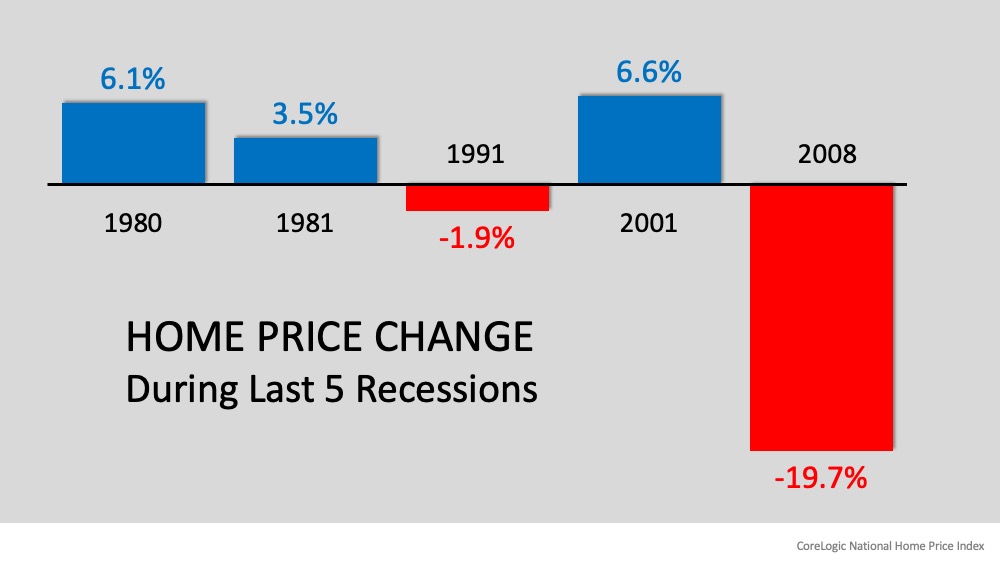
This is what three economic leaders are saying about the housing connection to this recession:
Robert Dietz, Chief Economist with NAHB
“The housing sector enters this recession underbuilt rather than overbuilt…That means as the economy rebounds – which it will at some stage – housing is set to help lead the way out.”
Ali Wolf, Chief Economist with Meyers Research
“Last time housing led the recession…This time it’s poised to bring us out. This is the Great Recession for leisure, hospitality, trade and transportation in that this recession will feel as bad as the Great Recession did to housing.”
John Burns, founder of John Burns Consulting, also revealed that his firm’s research concluded that recessions caused by a pandemic usually do not significantly impact home values:
“Historical analysis showed us that pandemics are usually V-shaped (sharp recessions that recover quickly enough to provide little damage to home prices).”
If we’re not in a recession yet, we’re about to be in one. This time, however, housing will be the sector that leads the economic recovery.
In times of uncertainty, one of the best things we can do to ease our fears is to educate ourselves with research, facts, and data. Digging into past experiences by reviewing historical trends and understanding the peaks and valleys of what’s come before us is one of the many ways we can confidently evaluate any situation. With concerns of a global recession on everyone’s minds today, it’s important to take an objective look at what has transpired over the years and how the housing market has successfully weathered these storms.
1. The Market Today Is Vastly Different from 2008
We all remember 2008. This is not 2008. Today’s market conditions are far from the time when housing was a key factor that triggered a recession. From easy-to-access mortgages to skyrocketing home price appreciation, a surplus of inventory, excessive equity-tapping, and more – we’re not where we were 12 years ago. None of those factors are in play today. Rest assured, housing is not a catalyst that could spiral us back to that time or place.
According to Danielle Hale, Chief Economist at Realtor.com, if there is a recession:
“It will be different than the Great Recession. Things unraveled pretty quickly, and then the recovery was pretty slow. I would expect this to be milder. There’s no dysfunction in the banking system, we don’t have many households who are overleveraged with their mortgage payments and are potentially in trouble.”
In addition, the Goldman Sachs GDP Forecast released this week indicates that although there is no growth anticipated immediately, gains are forecasted heading into the second half of this year and getting even stronger in early 2021.Three Reasons Why This Is Not a Housing Crisis | MyKCMBoth of these expert sources indicate this is a momentary event in time, not a collapse of the financial industry. It is a drop that will rebound quickly, a stark difference to the crash of 2008 that failed to get back to a sense of normal for almost four years. Although it poses plenty of near-term financial challenges, a potential recession this year is not a repeat of the long-term housing market crash we remember all too well.
2. A Recession Does Not Equal a Housing Crisis
Next, take a look at the past five recessions in U.S. history. Home values actually appreciated in three of them. It is true that they sank by almost 20% during the last recession, but as we’ve identified above, 2008 presented different circumstances. In the four previous recessions, home values depreciated only once (by less than 2%). In the other three, residential real estate values increased by 3.5%, 6.1%, and 6.6% (see below):Three Reasons Why This Is Not a Housing Crisis | MyKCM
3. We Can Be Confident About What We Know
Concerns about the global impact COVID-19 will have on the economy are real. And they’re scary, as the health and wellness of our friends, families, and loved ones are high on everyone’s emotional radar.
According to Bloomberg,
“Several economists made clear that the extent of the economic wreckage will depend on factors such as how long the virus lasts, whether governments will loosen fiscal policy enough and can markets avoid freezing up.”
That said, we can be confident that, while we don’t know the exact impact the virus will have on the housing market, we do know that housing isn’t the driver.
The reasons we move – marriage, children, job changes, retirement, etc. – are steadfast parts of life. As noted in a recent piece in the New York Times, “Everyone needs someplace to live.” That won’t change.
Bottom Line
Concerns about a recession are real, but housing isn’t the driver. If you have questions about what it means for your family’s homebuying or selling plans, let’s connect to discuss your needs.